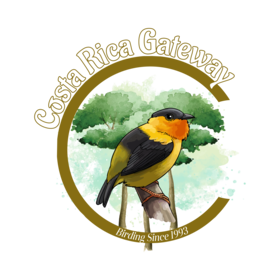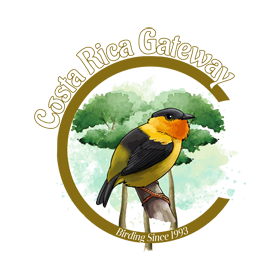- Passport: To enter Costa Rica you will need a valid passport that will not expire after 90 days upon arrival to Costa Rica. However, some International flights require a passport that is valid for at least 6 months from your departure to Costa Rica. It would be best to follow the latter to be on the safe side. Visas are not required for citizens of USA, Canada, or United Kingdom. It is always a good idea to make a copy of your passport and put somewhere separate than you actual passport. This copy will make securing a new passport at the US Embassy in San Jose easier should you lose your passport. CRG will assist you in securing a new passport should this happen.
- Binoculars and optional Spotting Scope with Tripod: Waterproof types are best, most guides at the lodges supply their own scope for you to use.
- Bird Book: We recommend the new field guide which is easy to carry in the field called “The Birds of Costa Rica – A Field Guide 2nd Edition” by Richard Garrigues and Robert Dean. The older field guide called “A Guide to the Birds of Costa Rica” by Stiles and Skutch can also be useful but is bulky.
- Camera and film: Beware of humidity problems with cameras and video equipment in the tropics. You may want to bring a compact hair dryer to remove this humidity. This should be done gently and over a period of time in order to not damage your equipment.
- Clothing: Long pants and long sleeve shirts are best to deter any insects and minor scratches from the vegetation. The new, lightweight outdoor variety is very comfortable and dries quickly. Shorts and T-shirts can also be useful. A lightweight jacket will be welcomed in the middle elevations, a fleece or medium weight jacket for those visiting the highlands such as Savegre Mountain Lodge. Laundry can be done at most of the lodges for those wanting to travel light.
- Shoes: Light weight hiking boots will be invaluable, preferably waterproof Gortex boots. Sandals are useful around the lodges and beach but should not be worn on the forest trails. Rubber boots are always an option but typically do not provide sufficient support for hiking.
- Rain gear: Umbrella or Poncho, whichever you feel is more practical; rain suits can be quite uncomfortable in the lowlands.
- Sun Protection: Sunscreen, Hat, and Sunglasses.
- Mosquito Repellent: Although mosquitoes will not be a problem in most of the areas you visit in Costa Rica it is still nice to have your own supply on hand when they are encountered. Repellent containing “Deet” works best such as Deep Woods Off. Deet is mildly poisonous but if used modestly poses no threat. It is not necessary to spray profuse amounts before going into the field unless you are hiking in chigger infested areas, see “Chiggers” under Info and Travel tips on the previous page. You should protect all rubberized or plastic areas of binoculars, scopes, watches, etc before spraying as repellent has a tendency to partially melt rubber and plastics. Repellent can be purchased in nearly all of the more modern supermarket types here in Costa Rica such as Mega-Super and Mas-x-Menos.
- Toiletries: Best to bring these with you but supermarkets in CR do carry a wide variety.
- Medications: Mainly prescription items, pharmacies and supermarkets have a wide variety of over-the-counter medicines that are quite effective. Costa Rica Gateway will also assist you in securing any medical needs you may require while touring Costa Rica with our agency.
Welcome to Costa Rica Gateway



